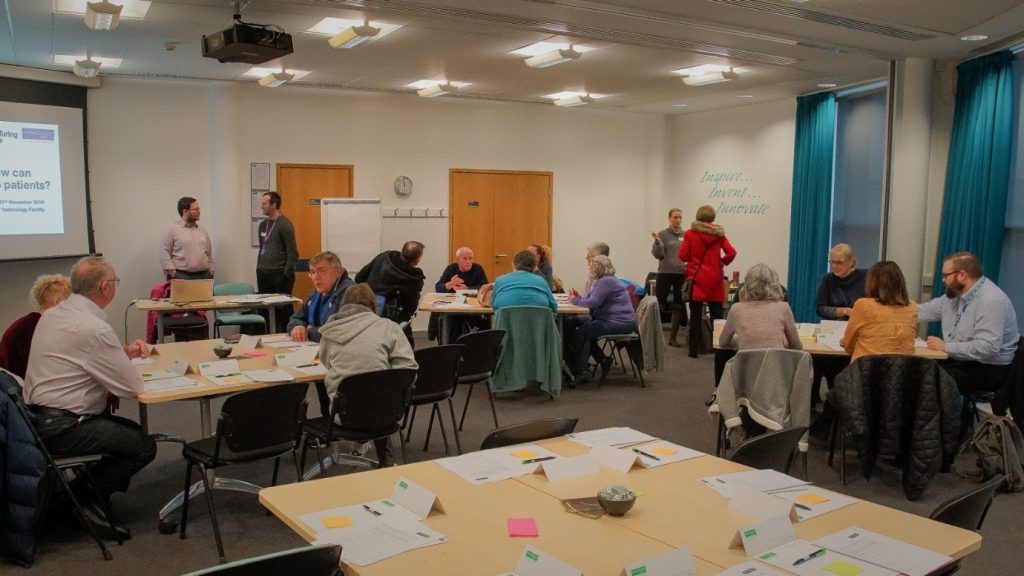
How research can help people with COPD: Five priority areas to support self-management
We love hearing directly from our staff, students and Public Contributors (members of the public who are involved and engaged with the Faculty’s research and teaching) about their Patient and Public Involvement and Engagement (PPIE) activities. This blog category features pieces written by guest authors from across the University.
Our guest authors are: Julia Mueller, Caroline Jay, Alan Davies, Alan Preston, Denise Hillman, Lisa Jane Brighton and Alexander Mathioudakis
Research institutions and funders are increasingly emphasising the importance of actively involving members of the public in research. This is relevant throughout the research cycle, from ensuring the research addresses what is most important to patients and families, to making sure the research findings are accessible and usable by those who could benefit from them.
On 21st November 2019, researchers and people with chronic obstructive pulmonary disease (COPD) met for a half-day event at The University of Manchester. The event, led by myself, Caroline Jay, Alan Davies, Alan Preston, Denise Hillman, Lisa Jane Brighton, and Alexander Mathioudakis was funded by the Alan Turing Institute. It aimed to bring researchers and people with COPD together to develop networks, and to explore how research can support self-management.
According to the NHS, ‘COPD is the name for a group of lung conditions that cause breathing difficulties’ and can include conditions such as emphysema (damage to the air sacs in the lungs) and chronic bronchitis (long-term inflammation of the airways). COPD commonly affects middle-aged people who have smoked.
Twenty-two people attended our workshop: thirteen were people living with COPD and nine were researchers/professionals. During the workshop, we undertook brainstorming activities to identify peoples’ concerns living with COPD, and explored how research could help.
Here, we present five priority areas for research on COPD self-management that were highlighted during our workshop.
1) Breathlessness & activity levels
Feeling breathless and not being able to undertake activities was a major concern for people with COPD. In one of our workshops, we discussed commercially available activity trackers that provide people with information about their activity levels. Attendees were concerned that these activity visualisations might have a discouraging effect for them by highlighting a progressive worsening in COPD.
2) Managing exacerbations
Attendees were also concerned about the risk of flare-ups caused by external factors that are difficult to control (such as air conditioning in buildings), and having a lack of knowledge on the management of exacerbations of their symptoms.
“The main conclusion our group came to was that we need some sort of handheld device to be able to check when we have an exacerbation, similar to how diabetics check their blood sugar levels. […] This could then alert a clinic or doctor when an exacerbation occurred and could indicate whether the person requires further assistance.” [COPD patient, workshop attendee]
3) Education and information for people with COPD
Attendees repeatedly mentioned the lack of information available for people living with COPD. Many wanted to know why they had COPD when others didn’t, what was causing their symptoms, and what treatments and services were available. Attendees were worried about the future and wanted a clearer picture of what symptom developments they could expect.
4) Education and information for the wider public
COPD involves impairments that are not immediately visible to others and, as such, attendees described encountering a lack of understanding and even aggression (e.g. when using disabled parking spaces) from members of the wider public. Attendees described how this led to anxiety and prevented them from being more active.
5) Improving interactions with healthcare professionals
Attendees appeared to have experienced some barriers to effective communications with their healthcare professionals. Attendees expressed a wish for a more COPD-specialised contact point, possibly aside from usual doctors, or in the form of doctors that are more familiar with the disease and its symptoms.
Conclusions and recommendations
Our event provided a unique opportunity for researchers and people with COPD to come together, discuss ideas, and build networks for future collaborations. Feedback shows that the event met the attendees’ expectations, and enabled them to meet and interact with other people with COPD which they found helpful. Future research on COPD self-management should consider the priority areas identified, and involve people living with COPD as partners in those projects.
To read more about this project, click here or email Julia.Mueller@mrc-epid.cam.ac.uk.
If you would like to share your PPIE activity with our readers, please email us at srbmh@manchester.ac.uk. For further information about PPIE events, training and involvement opportunities, you can sign up for our monthly digest, follow us on twitter, visit our website, or contact srbmh@manchester.ac.uk.

0 Comments